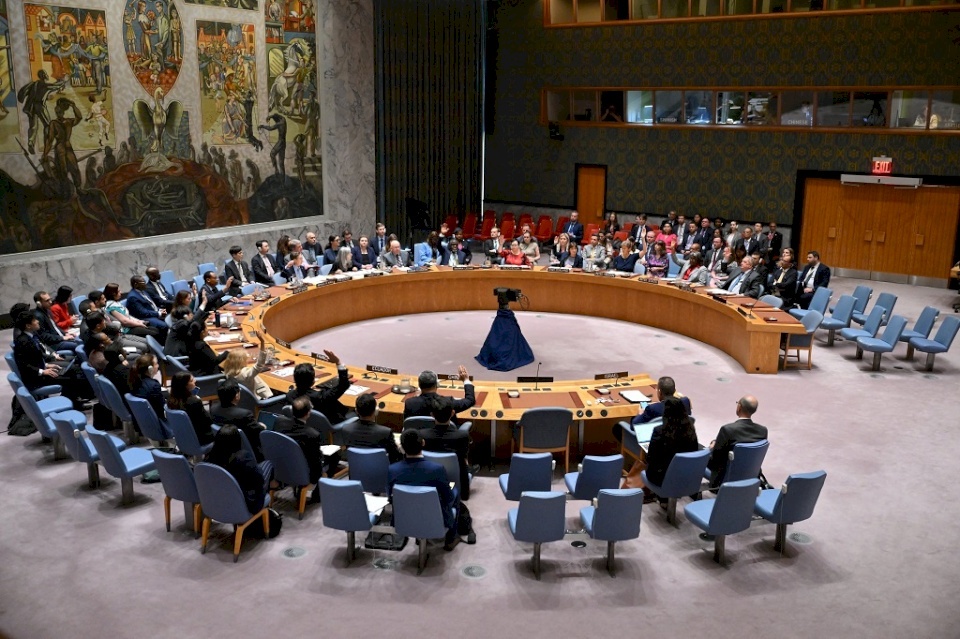
Arab & International
UN Security Council adopts historic resolution that consolidates autonomy in the Moroccan Sahara
SadaNews - The United Nations Security Council adopted a historic resolution that represents a qualitative shift in the process of resolving the fabricated conflict over the Moroccan Sahara; it expressed its full support for the UN Secretary-General and his personal envoy in facilitating and conducting negotiations, based on the Moroccan autonomy proposal, with the aim of reaching a fair, lasting, and mutually acceptable solution in line with the UN Charter. At the same time, it welcomed any constructive proposals offered by the parties in response to this Moroccan proposal.
Eleven out of the 15 member states voted in favor of the draft resolution, led by the United States (the penholder), along with the United Kingdom, France, Greece, Panama, and Korea, while three countries—China, Russia, and Pakistan—abstained, and no member states did not participate in the voting.
The body entrusted with maintaining international peace and security expressed its support for the efforts of the UN envoy in implementing its resolutions and moving forward in the political process, including through continued consultations between the personal envoy and each of Morocco, the Polisario Front, Algeria, and Mauritania, emphasizing the importance of respecting the ceasefire and avoiding any actions that threaten the political process.
In this context, the resolution called on all parties to engage in these discussions unconditionally, based on the Moroccan autonomy initiative, in order to reach a final political solution acceptable to both sides, emphasizing that a genuine autonomy plan could be the most viable solution and encouraging the parties to present ideas to support a mutually acceptable final solution.
It also called on member states to provide appropriate support and assistance for these negotiations and the efforts of the personal envoy, renewing the mandate of the MINURSO mission in the Sahara until October 31, 2026, in line with the recommendation in the UN Secretary-General's report submitted to the Security Council members.
The Security Council highlighted the need to expedite the achievement of this conflict resolution while welcoming the initiative of the personal envoy to hold meetings between the parties to build on the current momentum and seize this unprecedented opportunity for lasting peace.
The Council expressed its appreciation to the United States for its willingness to host the negotiations in support of the personal envoy's mission aimed at reaching a solution to the Sahara issue, while expressing serious concern over the shortfall in funding allocated for Sahrawi refugees, urging donors to provide additional funding and to register and account for refugees in the Tindouf camps.
The resolution also requested the UN Secretary-General to provide regular briefings to the UN Security Council, at any time deemed appropriate during the UN mission's mandate in the Sahara, and to provide a review six months after the renewal of this mandate regarding the future strategy of the mission, taking into account the results of negotiations between the parties.
The adoption of this resolution by the Security Council comes in a changing international context characterized by an expanding circle of recognition of Morocco's sovereignty over its southern territories, and a growing consensus among major powers on the need for a realistic approach based on autonomy as the sole and practical solution to the conflict.
This shift coincides with a strategic trend within the US administration, under Donald Trump, towards promoting a peace agreement that ends the rift between Morocco and Algeria and enhances security and stability in North Africa, a region of paramount geopolitical importance in US strategy.
The new UN resolution takes on an unprecedented qualitative dimension, moving beyond merely managing a regional conflict to establishing a new vision for a realistic political solution that aligns with the major trends of the international system; the Sahara issue is no longer a limited African or regional file but has become part of the equation of new global balances that seek to establish stability and combat separatist tendencies.
This historic UN resolution represents the culmination of a high-level diplomatic process led by King Mohammed VI, characterized by wisdom and foresight, which has succeeded in consolidating the Moroccan approach to the Sahara issue on the international stage, gaining the trust of major powers influential in global decision-making, and convincing them of the justice and validity of the Moroccan position and the credibility of the autonomy solution.
Read Also

International Calls to De-escalate and Warnings of Serious Consequences After Strikes on I...

Syria: 4 Killed in Suwayda Due to Iranian Missile Strike

Moscow: The Attack on Iran is Dangerous and May Lead to Catastrophe

Closure of Airspace and Interception of Iranian Missiles in Gulf States

Lebanon Rejects Involvement in Regional Conflicts

Jordanian Army Announces the Downing of Two Ballistic Missiles Targeting the Kingdom

Two Explosions Rock Jalalabad in Eastern Afghanistan... Pakistan Denies Its Fighter Jet Cr...

